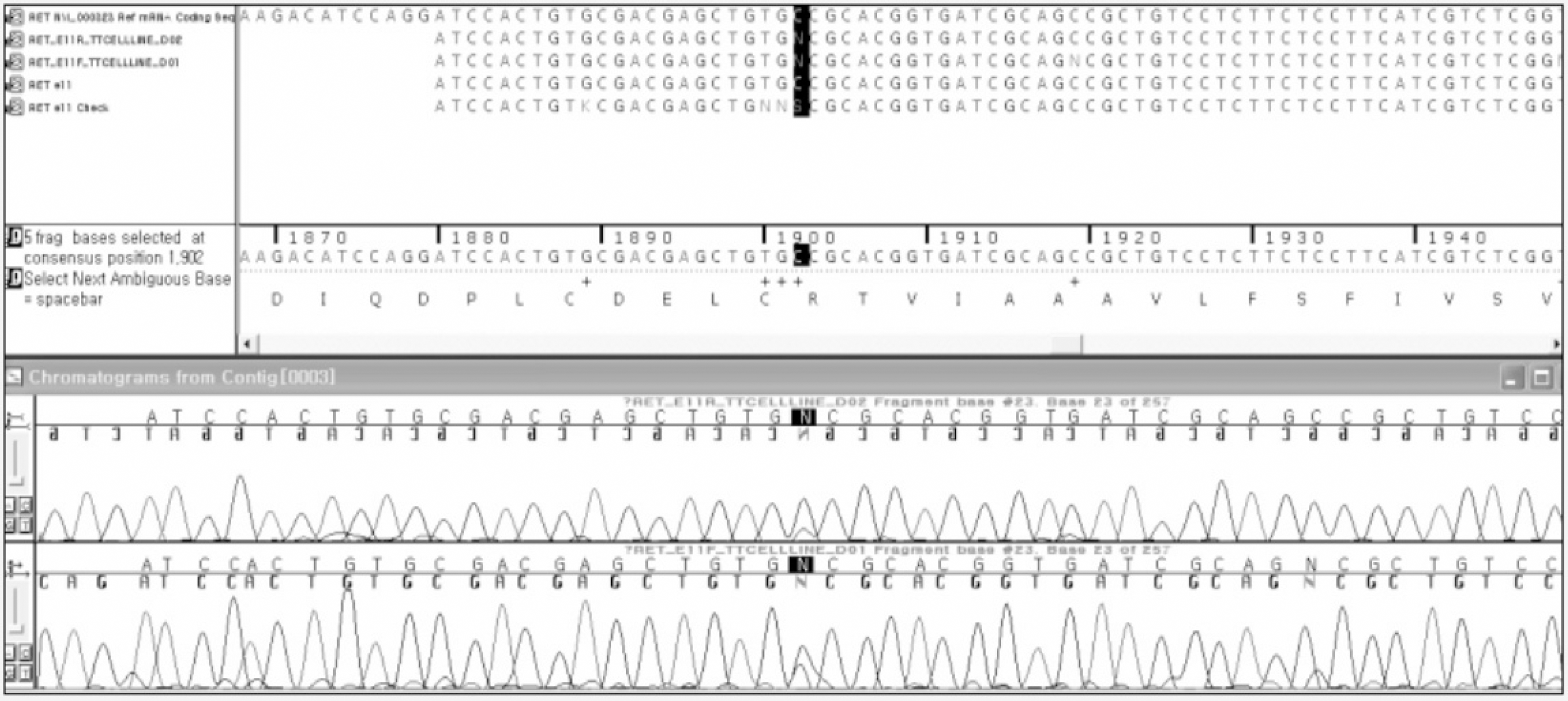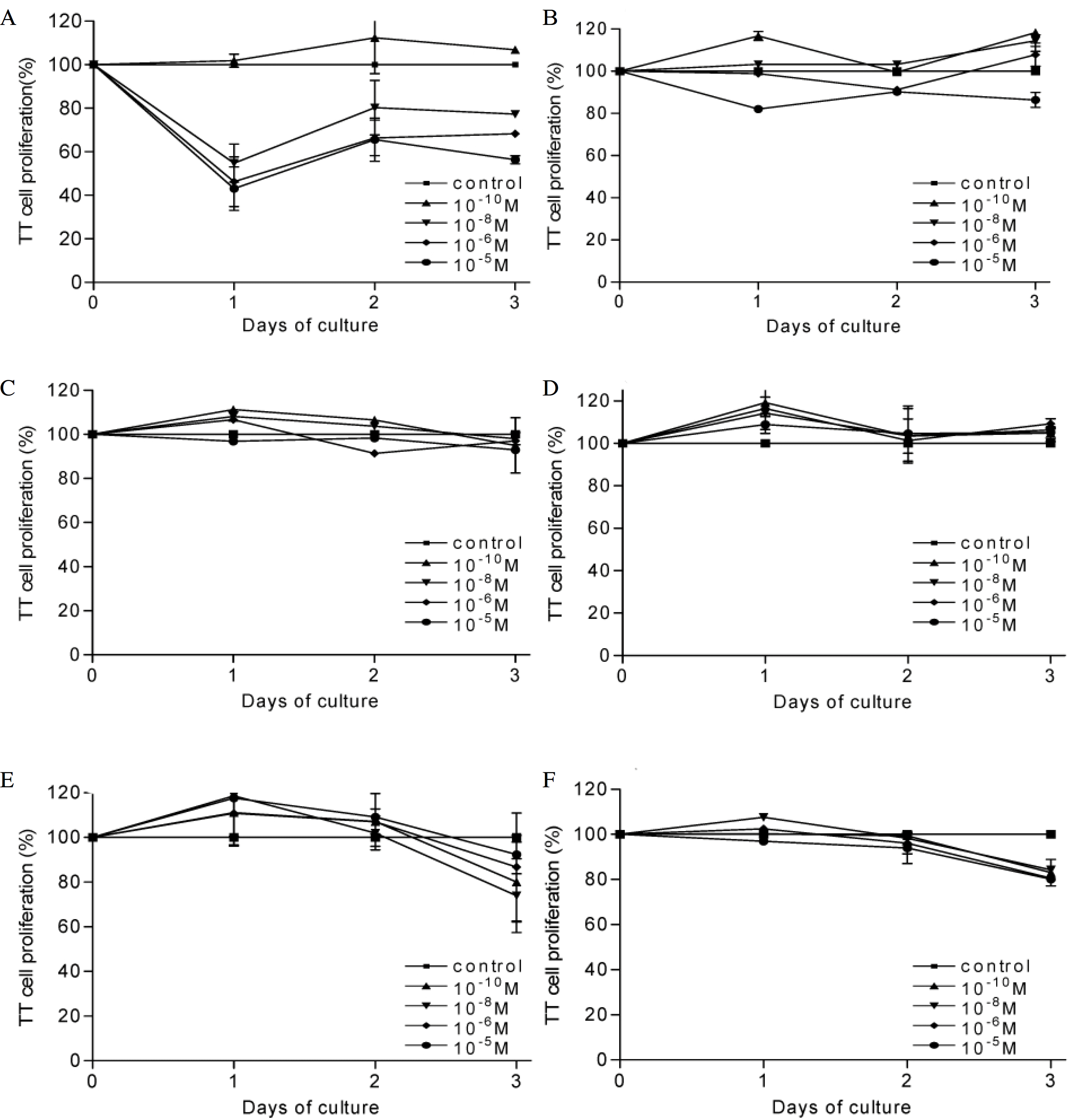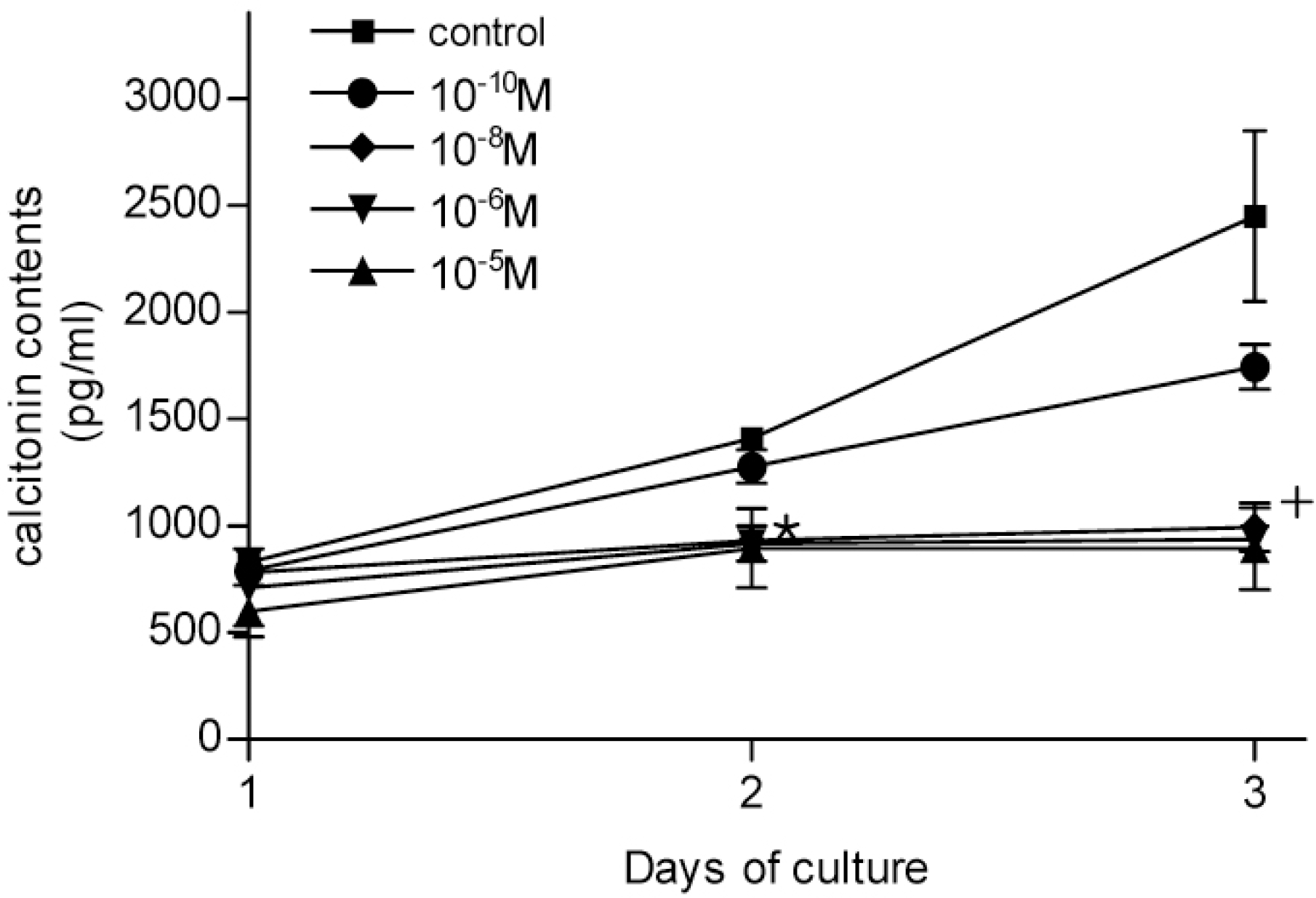Abstract
Background
Surgical excision is the only effective treatment of medullary thyroid carcinoma (MTC) and there is no certain treatment for recurrence or distant metastasis. Materials that influence MTC cell proliferation were recently reported. Presently, we evaluated the influence of dexamethasone, somatostatin, progesterone, estradiol-17-beta, forskolin and gastrin on MTC cell proliferation and calcitonin secretion.
Methods
Genomic DNA was extracted and sequenced from untreated thyroid TT cells and cells treated with 10-5∼10-10 M dexamethasone, somatostatin, progesterone, estradiol-17-beta, forskolin or gastrin, and cultured for 1∼6 days. Cell proliferation was assessed using a BrdU assay at days 1, 2, 3, and 6. Calcitonin in the culture medium from dexamethasone-treated TT cells was measured at days 1∼3.
Results
Replacement of cysteine with tryptophan at codon 634 of exon 11 was evident in treated TT cells. There was no significant difference in cell proliferation at days 1∼3 in cells treated with somatostatin, progesterone, estradiol-17-beta, gastrin and forskolin, while proliferation was inhibited in dexamethasone-treated cells in a concentration-dependent manner from 10-5∼10-8 M with no inhibition evident at 10-10 M. Calcitonin levels in 10-5∼10-8 M dexamethasone-treated cells were decreased.
Go to : 
References
1. Plaza Menacho I, de Groot JW, Links T, Plukker J, Eggen BJ, Hofstra R. Re: “Inhibition of medullary thyroid carcinoma (MTC) cell proliferation and RET phosphorylation by tyrosine kinase inhibitors”. Surgery. 135:240–241. 2004.

2. Skinner MA, Safford SD, Freemerman AJ. RET tyrosine kinase and medullary thyroid cells are unaffected by clinical doses of STI571. Anticancer Res. 23:3601–3606. 2003.
3. Cohen MS, Hussain HB, Moley JF. Inhibition of medullary thyroid carcinoma cell proliferation and RET phosphorylation by tyrosine kinase inhibitors. Surgery. 132:960–966. 2002.

4. Zatelli MC, Tagliati F, Piccin D, Taylor JE, Culler MD, Bondanelli M, degli Uberti EC. Somatostatin receptor subtype 1-selective activation reduces cell growth and calcitonin secretion in a human medullary thyroid carcinoma cell line. Biochem Biophys Res Commun. 297:828–834. 2002.

5. Liu JL, Patel YC. Glucocorticoids inhibit somatostatin gene expression through accelerated degradation of somatostatin messenger ribonucleic acid in human thyroid medullary carcinoma (TT) cells. Endocrinology. 136:2389–2396. 1995.

6. Frendo JL, Delage-Mourroux R, Cohen R, Pichaud F, Pidoux E, Guliana JM, Jullienne A. Calcitonin receptor mRNA expression in TT cells: effect of dexamethasone. Mol Cell Endocrinol. 139:37–43. 1998.

7. Blechet C, Lecomte P, De Calan L, Beutter P, Guyetant S. Expression of sex steroid hormone receptors in C cell hyperplasia and medullary thyroid carcinoma. Virchows Arch. 450:433–439. 2007.

8. Colomer A, Martinez-Mas JV, Matias-Guiu X, Llorens A, Cabezas R, Prat J, Garcia-Ameijeiras A. Sex-steroid hormone receptors in human medullary thyroid carcinoma. Mod Pathol. 9:68–72. 1996.
9. Yang K, Pearson CE, Samaan NA. Estrogen receptor and hormone responsiveness of medullary thyroid carcinoma cells in continuous culture. Cancer Res. 48:2760–2763. 1988.
10. Venkateswaran A, Marsee DK, Green SH, Jhiang SM. Forskolin, 8-Br-3', 5'-cyclic adenosine 5'-monophosphate, and catalytic protein kinase A expression in the nucleus increase radioiodide uptake and sodium/iodide symporter protein levels in RET/PTC1-expressing cells. J Clin Endocrinol Metab. 89:6168–6172. 2004.
11. Blaker M, Arrenberg P, Stange I, Schulz M, Burghardt S, Michaelis H, Pace A, Greten H, von Schrenck T, de Weerth A. The cholecystokinin2-receptor mediates calcitonin secretion, gene expression, and proliferation in the human medullary thyroid carcinoma cell line, TT. Regul Pept. 118:111–117. 2004.
12. Zatelli MC, Piccin D, Tagliati F, Bottoni A, Luchin A, Vignali C, Margutti A, Bondanelli M, Pansini GC, Pelizzo MR, Culler MD, Degli Uberti EC. Selective activation of somatostatin receptor subtypes differentially modulates secretion and viability in human medullary thyroid carcinoma primary cultures: Selective activation of somatostatin receptor subtypes differentially modulates secretion and viability in human medullary thyroid carcinoma primary cultures: potential clinical perspectives. J Clin Endocrinol Metab. 91:2218–2224. 2006.
13. Nocera M, Baudin E, Pellegriti G, Cailleux AF, Mechelany-Corone C, Schlumberger M. Treatment of advanced medullary thyroid cancer with an alternating combination of doxorubicin-streptozocin and 5 FU-dacarbazine. Groupe d'Etude des Tumeurs a Calcitonine (GETC). Br J Cancer. 83:715–718. 2000.
14. Wu LT, Averbuch SD, Ball DW, de Bustros A, Baylin SB, McGuire WP 3rd. Treatment of advanced medullary thyroid carcinoma with a combination of cyclophosphamide, vincristine, and dacarbazine. Cancer. 73:432–436. 1994.

15. Modigliani E, Cohen R, Joannidis S, Siame-Mourot C, Guliana JM, Charpentier G, Cassuto D, Bentata Pessayre M, Tabarin A, Roger P, Caron P, Gulllausseau PJ, Lalau JD, Tournlafre J, Bayard F, Aulévre P, James-Deldier A, Catmettest C. Results of longterm continuous subcutaneous octreotide administration in 14 patients with medullary thyroid carcinoma. Clin Endocrinol (Oxf). 36:183–186. 1992.
16. Schlumberger M, Carlomagno F, Baudin E, Bidart JM, Santoro M. New therapeutic approaches to treat medullary thyroid carcinoma. Nat Clin Pract Endocrinol Metab. 4:22–32. 2008.

17. Frank-Raue K, Fabel M, Delorme S, Haberkorn U, Raue F. Efficacy of imatinib mesylate in advanced medullary thyroid carcinoma. Eur J Endocrinol. 157:215–220. 2007.

18. de Groot JW, Zonnenberg BA, van Ufford-Mannesse PQ, de Vries MM, Links TP, Lips CJ, Voest EE. A phase II trial of imatinib therapy for metastatic medullary thyroid carcinoma. J Clin Endocrinol Metab. 92:3466–3469. 2007.

19. Hong D, Ye L, Gagel R, Chintala L, El Naggar AK, Wright J, Kurzrock R. Medullary thyroid cancer: targeting the RET kinase pathway with sorafenib/tipifarnib. Mol Cancer Ther. 7:1001–1006. 2008.

20. Lanzi C, Cassinelli G, Nicolini V, Zunino F. Targeting RET for thyroid cancer therapy. Biochem Pharmacol. 77:297–309. 2009.

21. Mitsiades CS, McMillin D, Kotoula V, Poulaki V, McMullan C, Negri J, Fanourakis G, Tseleni-Balafouta S, Ain KB, Mitsiades N. Antitumor effects of the proteasome inhibitor bortezomib in medullary and anaplastic thyroid carcinoma cells in vitro. J Clin Endocrinol Metab. 91:4013–4021. 2006.

22. Cho MA, Lee MK, Nam KH, Chung WY, Park CS, Lee JH, Noh T, Yang WI, Rhee Y, Lim SK, Lee HC, Lee EJ. Expression and role of estrogen receptor alpha and beta in medullary thyroid carcinoma: Expression and role of estrogen receptor alpha and beta in medullary thyroid carcinoma: different roles in cancer growth and apoptosis. J Endocrinol. 195:255–263. 2007.
23. Kurebayashi J, Otsuki T, Tanaka K, Yamamoto Y, Moriya T, Sonoo H. Medroxyprogesterone acetate decreases secretion of interleukin-6 and parathyroid hormone-related protein in a new anaplastic thyroid cancer cell line, KTC-2. Thyroid. 13:249–258. 2003.

24. Reubi JC, Waser B. Unexpected high incidence of cholecystokinin-B/gastrin receptors in human medullary thyroid carcinomas. Int J Cancer. 67:644–647. 1996.

25. Amiri-Mosavi A, Ahlman H, Tisell LE, Wangberg B, Kolby L, Forssell-Aronsson E, Lundberg PA, Lindstedt G, Nilsson O. Expression of cholecystokinin-B/gastrin receptors in medullary thyroid cancer. Eur J Surg. 165:628–631. 1999.
26. Blaker M, de Weerth A, Tometten M, Schulz M, Hoppner W, Arlt D, Hoang-Vu C, Dralle H, Terpe H, Jonas L, von Schrenck T. Expression of the cholecystokinin 2-receptor in normal human thyroid gland and medullary thyroid carcinoma. Eur J Endocrinol. 146:89–96. 2002.

27. Vitale G, Tagliaferri P, Caraglia M, Rampone E, Ciccarelli A, Bianco AR, Abbruzzese A, Lupoli G. Slow release lanreotide in combination with interferon-alpha2b in the treatment of symptomatic advanced medullary thyroid carcinoma. J Clin Endocrinol Metab. 85:983–988. 2000.
Go to : 
 | Fig. 1.Direct sequence analysis of RET mutation in TT cells. The substitution of Cys (TGC) to Trp (TGG) was detected at codon 634 of exon 11. |
 | Fig. 2.Time and dose related effects of dexamethasone (A) progesterone (B) estradiol-17-beta (C) gastrin (D) somatostatin (E) and forskolin (F) on TT cell proliferation. The dose dependent decrease in TT cell proliferation with exposure to only dexamethasone is demonstrated. Results presented are the mean of proliferation ratio (mean ±SD). |
 | Fig. 3.Calcitonin levels during TT cell proliferation. Calcitonin levels are increased steadily at the control during 1, 2, 3 day. Calcitonin levels in the dexamethasone treated cells (10-8, 10-6 10-5 M) are inhibited about the increase in Calcitonin levels (* P < 0.05 vs. control day 1, †P < 0.05 vs. control day 2). Results presented are the mean of Calcitonin levels (mean ±SD). |




 PDF
PDF ePub
ePub Citation
Citation Print
Print


 XML Download
XML Download